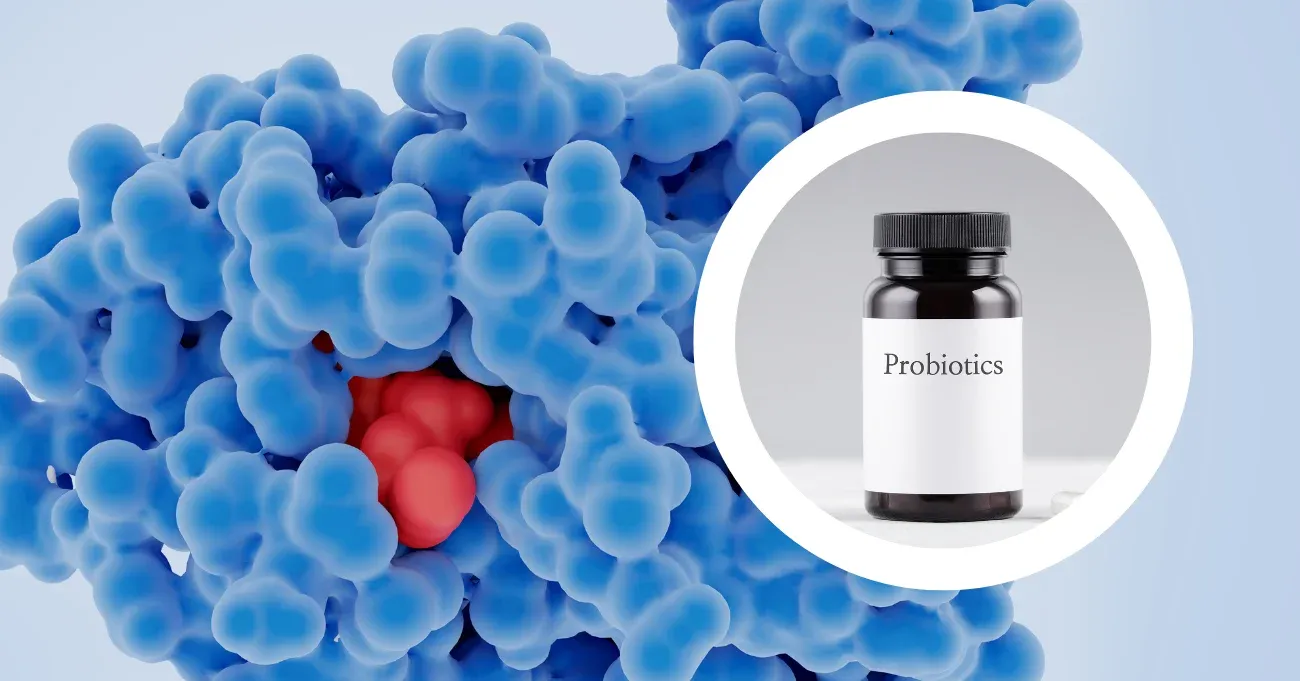
Choosing between digestive enzymes vs probiotics will significantly affect gut health and general well-being. Both deliver different benefits and are used for other purposes concerning digestive health. It is vital to understand the difference in effectiveness, the quality of ingredients, and cost. Knowing these differences will empower you to select the ideal supplement for your digestive health journey.
At Nudge, we provide comprehensive insight into the battle of digestive enzymes versus probiotics, thus allowing you to make an informed choice by comparing their unique features. Furthermore, our expertise lies in developing several health supplements to solve various digestive issues so that you receive optimal support for your digestive function.
Based on your health objectives, this review compares digestive enzymes vs probiotics to help you decide whether you need one or both supplements. We’ll discuss their cost structures, value for money, and achievable side effects to show you the way to a well-thought-out decision. By the end, you’ll understand how each option can impact your daily health by evaluating effectiveness, cost, and possible side effects to hit a more personal angle on gut health.
What Are Digestive Enzymes?
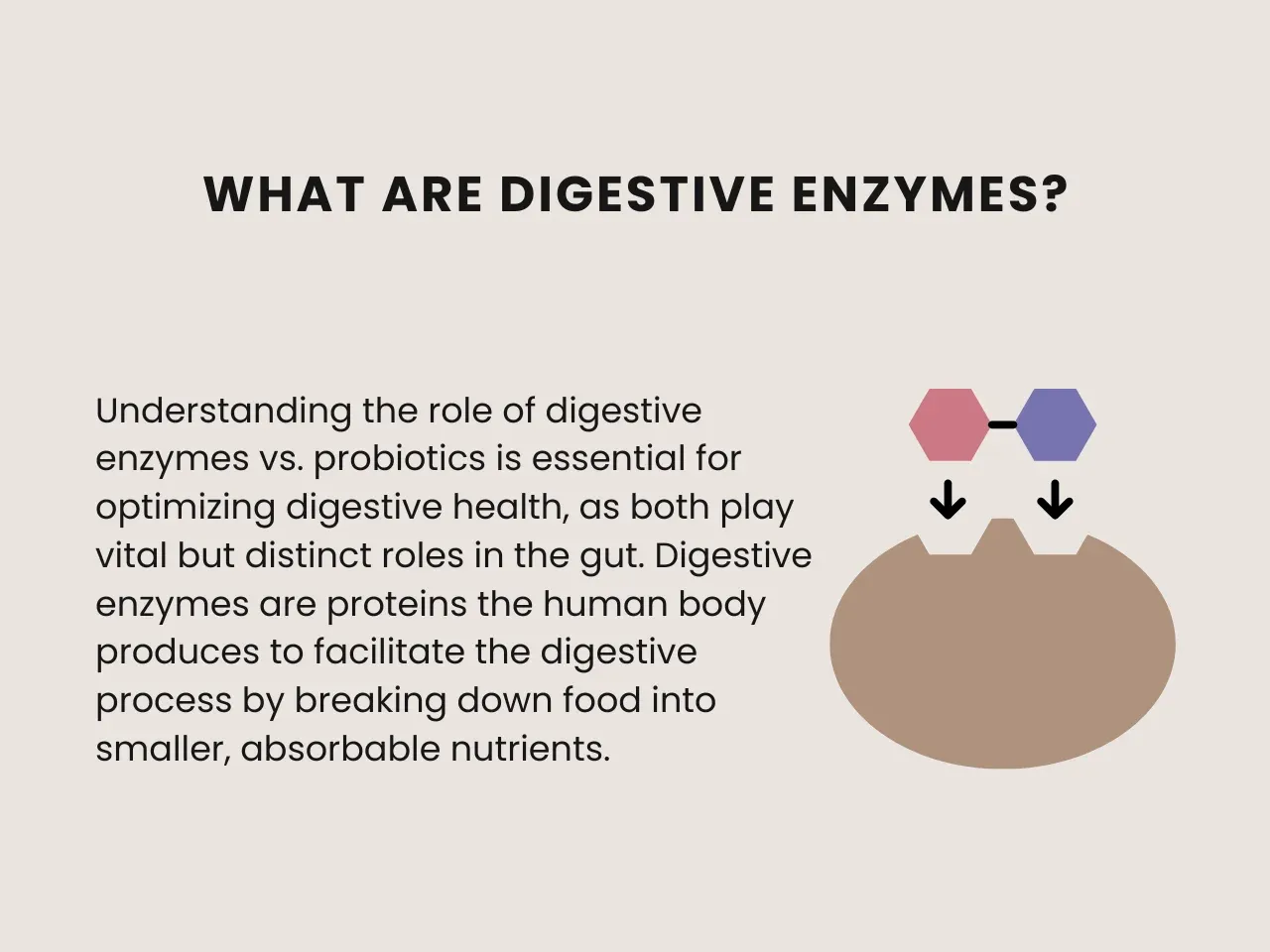
Understanding the role of digestive enzymes vs. probiotics is essential for optimizing digestive health, as both play vital but distinct roles in the gut. Digestive enzymes are proteins the human body produces to facilitate the digestive process by breaking down food into smaller, absorbable nutrients.
They speed up specific chemical reactions by breaking down the complex food components-carbohydrates, proteins, and fats-into simpler molecules that the digestive system can handle effortlessly. Thus, digestive enzymes ensure the breakdown of food and provide essential nutrients for energy production, cellular repair, and other vital functions that support overall health.
Types of Digestive Enzymes
Digestive enzymes are proteins that break down different types of food into absorbable nutrients. Each enzyme targets specific nutrients—carbohydrates, proteins, or fats—allowing the body to process various foods efficiently. Understanding the differences between probiotic and digestive enzymes is crucial, as each supports digestive health uniquely. Discover the key types of digestive enzymes and their contributions to digestion:
- Amylase: Amylase mainly refers to the enzymes in saliva and the pancreas that break down carbohydrates into simple sugars, making digestion easier. It is primarily implicated in the digestion process for starchy foods like bread, pasta, and potatoes.
- Proteases: These are enzymes secreted from the stomach, pancreas, and small intestine that facilitate the breakdown of proteins into amino acids. Protease is an important enzyme that promotes the digestion of foods containing high amounts of proteins, like meats, beans, and eggs.
- Lipase: This enzyme is produced by the pancreas and secreted into the small intestine. It assists in fat digestion by breaking it down into fatty acids and glycerol. Thus, this enzyme is indispensable in digesting foods rich in oils, nuts, and extra dairy products.
Why Supplement with Digestive Enzymes
When the body lacks sufficient digestive enzymes, as seen in conditions like pancreatic insufficiency, it can lead to digestive discomfort and nutrient malabsorption. Foods not being appropriately digested can cause bloating, gases, and pain. Digestive enzyme supplements are often prescribed to treat enzyme deficiencies, helping individuals with digestive complications such as lactose intolerance when considering probiotic and digestive enzymes.
Enzyme supplements support the breakdown of food for efficient digestion. For instance, lactase supplements enable those who cannot digest lactose to consume it comfortably. In the context of digestive enzymes vs. probiotics, individuals can enhance their gut microbiota by supplementing with digestive enzymes, leading to a more comfortable digestive experience.
What Are Probiotics and How Do They Support Gut Health?
Probiotics are living bacteria and yeasts that help restore proper function and balance to the gut microbiome, a complex ecosystem involving microorganisms promoting good health. Maintaining a healthy balance of beneficial bacteria, probiotics enhance digestion, immune function, and overall gut comfort, especially when comparing digestive enzymes vs. probiotics.
How Probiotics Support Gut Health
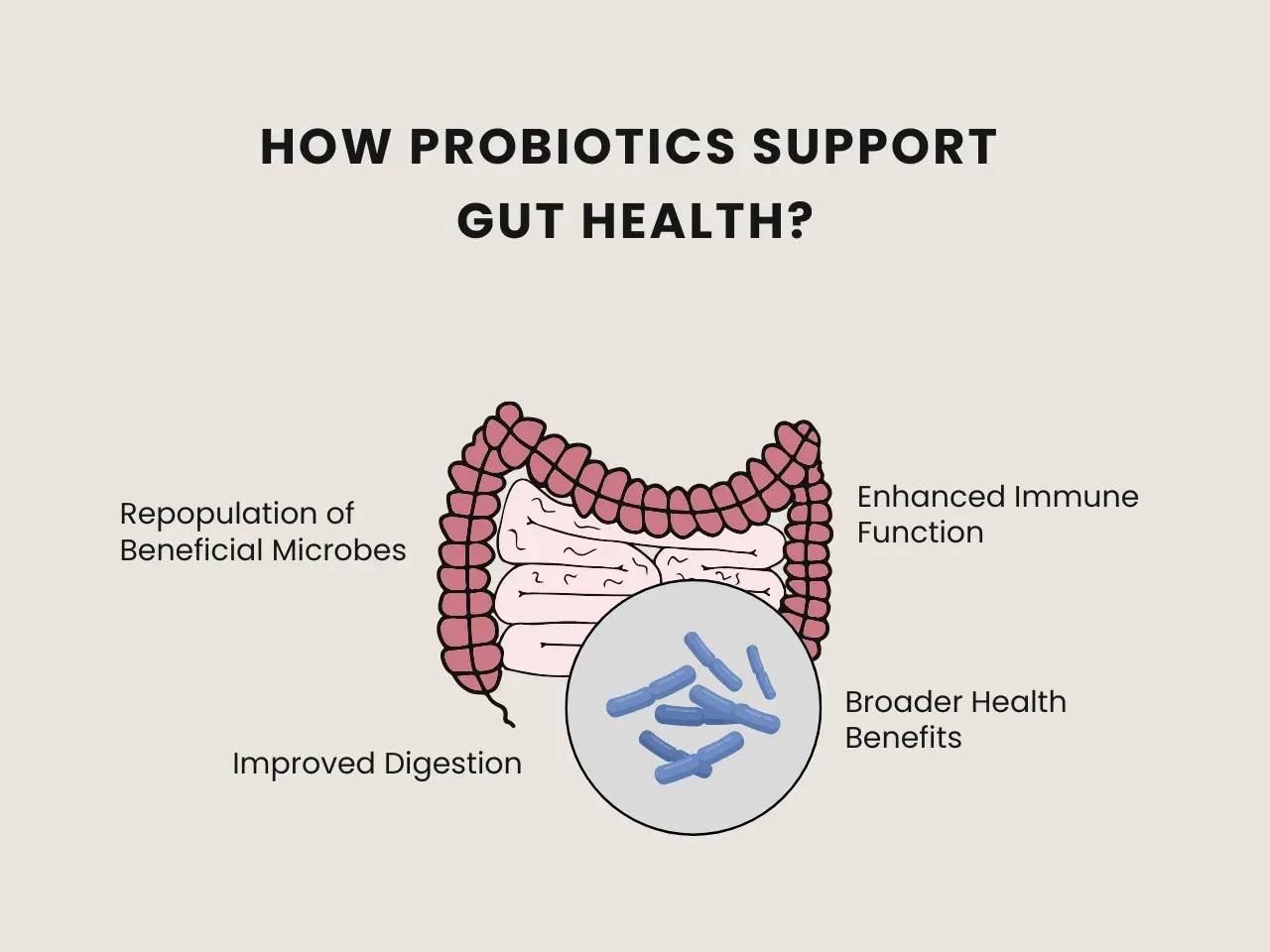
Probiotics are essential in gut health as they help introduce good bacteria into the gut microbiome. These live microorganisms assist digestion and can play a major role in boosting the immune system to secure general body health. Understanding the differences between digestive enzymes vs. probiotics will help you appreciate how each can enhance your well-being.
Check out some of these expected benefits you should know to help you understand how probiotic vitamins can help improve your health:
Repopulation of Beneficial Microbes
Understanding the differences between probiotic and digestive enzymes clarifies how introducing good bacteria into the gut microbiome supports digestion and strengthens the immune system for a healthier gut environment. Probiotics help reinstate and balance microbiota most effectively to fight off pathogenic bacteria, hence improving gastrointestinal health.
Probiotics not only improve nutrient absorption but also play a role in maintaining inflammatory processes in the gut microbiome, promoting diversity and resilience. This balance is crucial to health in general because a well-cared-for gut equals better digestion, immunity, and reduced risk of gastrointestinal disorders.
Improved Digestion
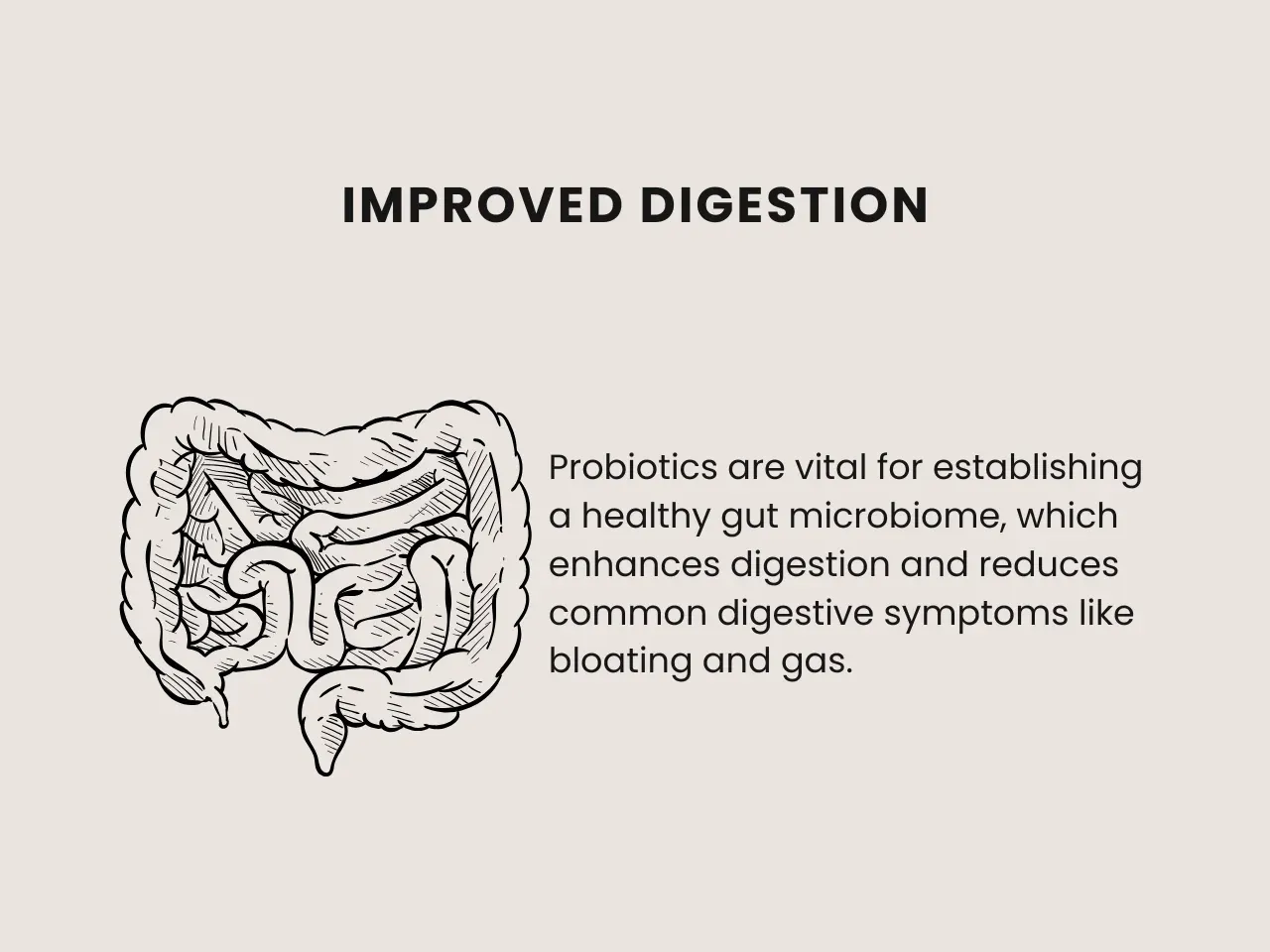
Probiotics are essential in establishing correct gut flora, which is crucial for easier digestion. Understanding the differences between probiotics vs digestive enzymes highlights how these beneficial bacteria influence the composition of the gut microbiome. They control nearly all digestion processes, ensuring nutrients are broken down and absorbed more efficiently.
Due to this gut-friendly environment, most people who suffer from common digestive symptoms usually significantly reduce bloating, gas buildup, and irregular bowel movements. Improved digestion makes life more comfortable and allows one to enjoy food quickly, unlike when feelings of indigestion arise.
Enhanced Immune Function
Among the most outstanding benefits of probiotics is their enhancement of immune function. Some key points regarding probiotics are that they develop a gut environment with a healthy microbiome, consequently protecting against harmful pathogens. They can also assist in regulating stomach acid, which is crucial for proper digestion and overall gut health.
Studies have shown that probiotics can reduce the risk of infections and maintain a balanced immune response. Adding probiotics to your routine can also help improve immune function and overall health. However, it is always advisable to seek medical advice before starting any supplementation, especially for individuals with underlying health conditions like cystic fibrosis, acid reflux, and abdominal pain.
Broader Health Benefits
A good gut microbiome encourages smoother digestion and helps maintain optimal immune function, which is often crucial to managing many of our medical conditions and reducing some infection risks. Discovering the differences between digestive enzymes vs probiotics highlights how both can contribute to overall wellness.
Adding probiotics is one proactive way to ensure holistic health in modern life. This beneficial bacteria improves a person's health and endurance by continuously supporting the gut microbiome. The strategic adoption of these in one's diet might lead to long-lasting improvements in physical and mental health, showing the importance of gut health in balancing life.
Key Probiotic Strains and Their Benefits
Probiotics are essential for a balanced gut microbiome and overall health. In discussing digestive enzymes vs probiotics, it's crucial to recognize that different probiotic strains target various digestion and immune enhancement benefits. Understanding these strains will help individuals make informed choices about what they take for optimum health.
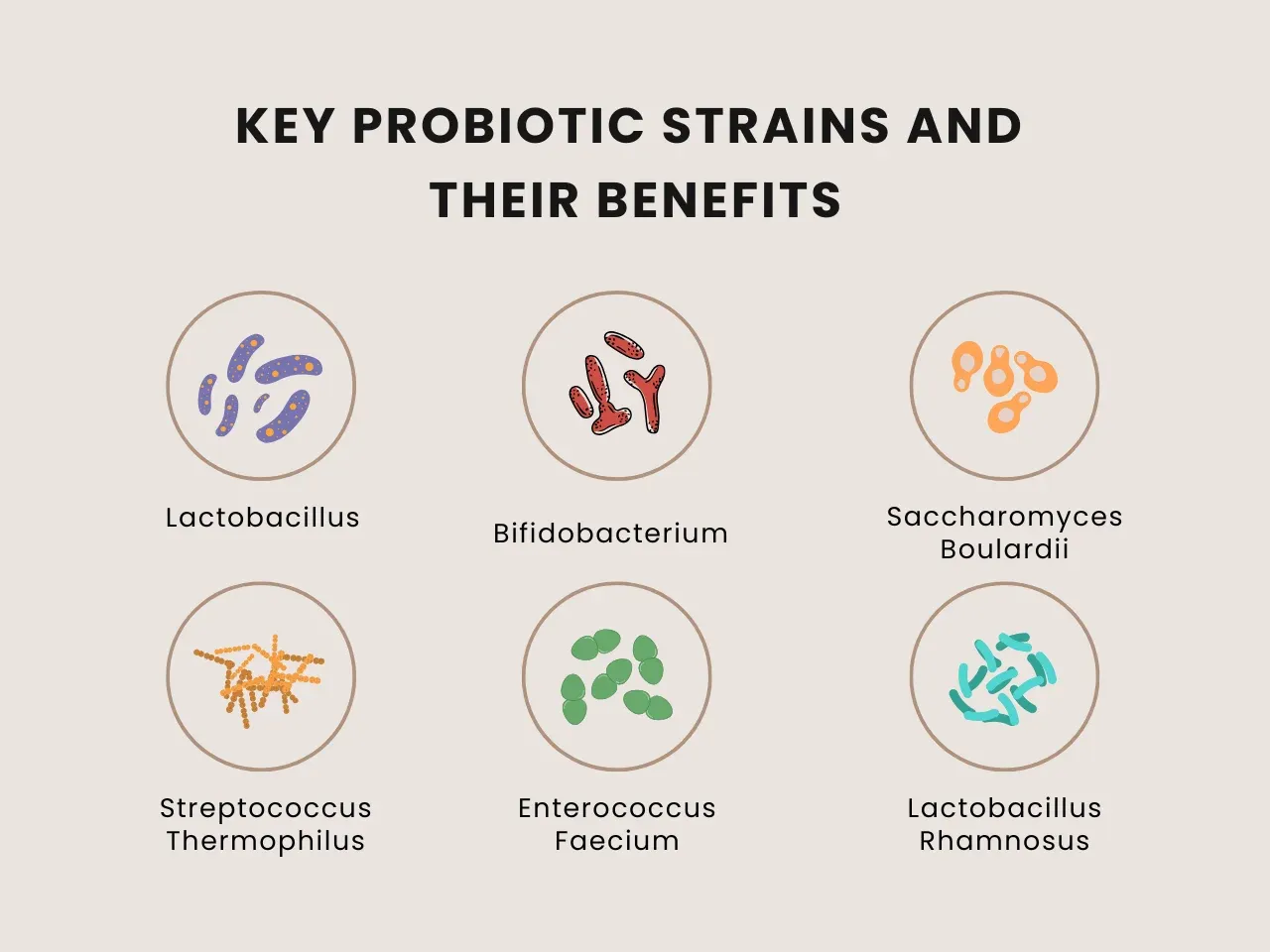
- Lactobacillus: It is one of the most common probiotics in yogurt and other fermented foods. It helps digest lactose and sugar in milk, making it much easier for sensitive people. Lactobacillus strains are also known to reduce bloating and aid in regularity.
- Bifidobacterium: Found in certain fermented dairy products and supplements, this strain helps regulate gut bacteria and supports gut lining integrity. It is effective in reducing bloating and gas while enhancing immune response. Additionally, Bifidobacterium produces short-chain fatty acids that nourish gut cells, strengthening the gut barrier.
- Saccharomyces Boulardii: This is a potent probate yeast for preventing and treating diarrhea, including antibiotic-associated diarrhea. It maintains gut flora balance and enhances immune response, hence beneficial for gastrointestinal conditions.
- Streptococcus Thermophilus: This is the type commonly used in yogurt and cheese. This bacteria promotes the digestion of lactose, hence making the production of compounds like lactic acid. Lactic acid helps decrease the gut pH and inhibit the growth of other pathogenic bacteria. It also helps maintain a healthy intestine by improving digestion.
- Enterococcus Faecium: This is added in probiotic agents for its resistance properties. It is an intestinal-friendly strain that inhibits the growth of most pathogenic bacteria. It has been used in several probiotic preparations to demonstrate the enhancement of immune function.
- Lactobacillus Rhamnosus: This is one of the most popular probiotic strains used today, mainly for curing gastrointestinal disorders such as diarrhea and constipation. It also improves a person's immune responses and supports the digestive tract.
When to Use Digestive Enzymes vs. Probiotics
Probiotic and digestive enzymes have different functions but can complement each other to help improve digestive health. Digestive enzymes are proteins that degrade and help provide adequate nutrition from food for nutrient absorption. On the other hand, probiotics include live bacteria and yeasts that maintain a healthy balance necessary for long-term gut health.
How Digestive Enzymes Work vs. Probiotics
Though they work differently, probiotic and digestive enzymes are essential in maintaining digestive health. Digestive enzymes help immediately digest food into absorbable nutrients, while probiotics take their time to condition the intestines for a gut-friendly microbiome. Knowing the difference allows individuals to choose the best approach for their digestive needs.
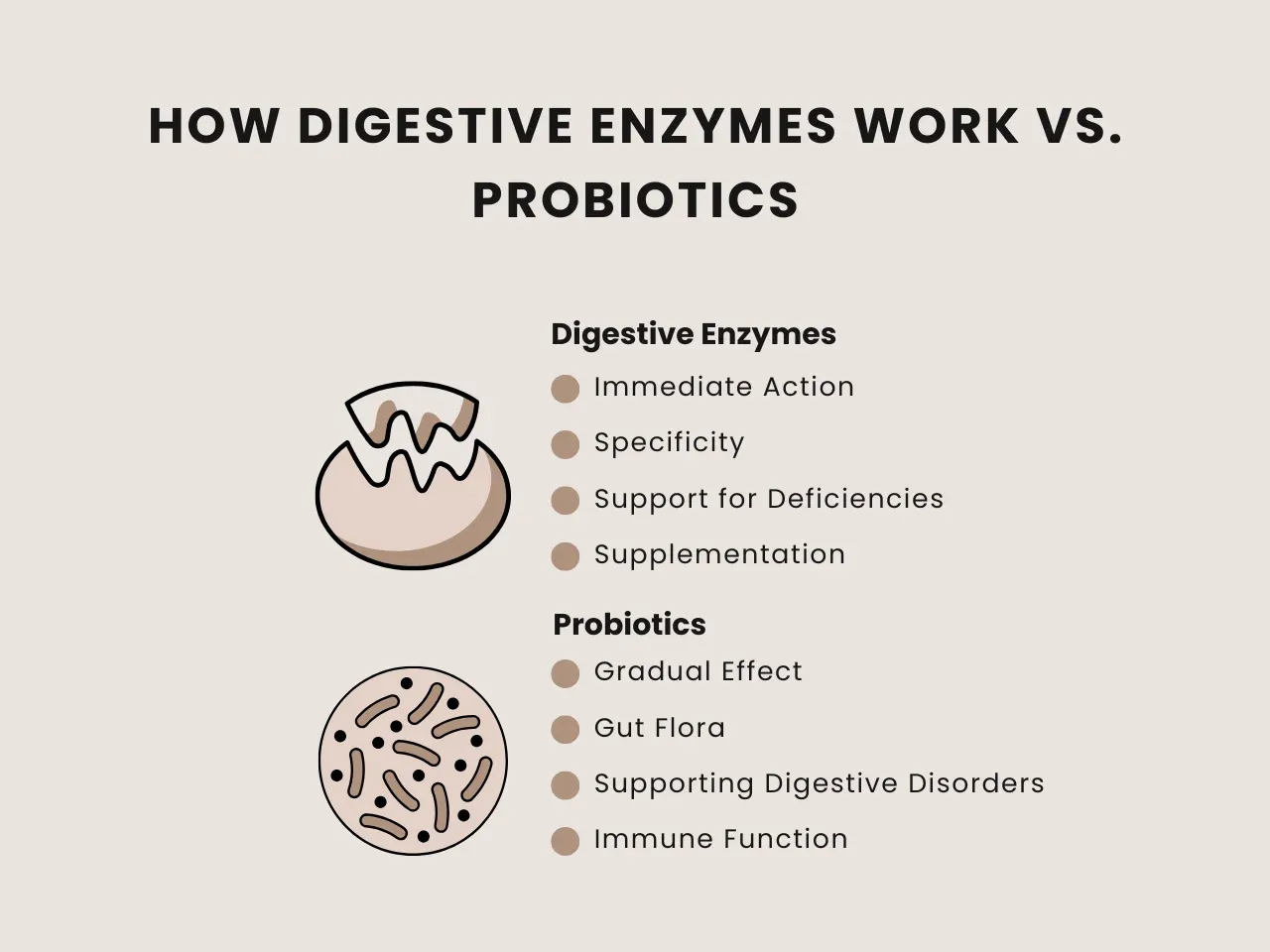
Digestive Enzymes
- Immediate Action: Digestive enzymes immediately act upon the intake of carbohydrates, fats, and proteins by breaking them down into absorbable nutrients, quickening the relief against digestive problems.
- Specificity: Different types of enzymes act on different types of food components. For example, lactase digests lactose, whereas carbohydrates are digested by amylase.
- Support for Deficiencies: These are beneficial for people suffering from enzyme deficiency or food intolerance and can help deal with symptoms like bloating, gas, and bloating after eating.
- Supplementation: Sometimes, supplementation with digestive enzymes along with the meal may be helpful for better digestion and absorption.
Probiotics
- Gradual Effect: Probiotic food gradually affects gut health and is believed to enhance the growth of good bacteria over harmful bacteria, hence offering long-term digestive health.
- Gut Flora: They balance the gastrointestinal microflora, preventing gut problems and improving physiology.
- Supporting Digestive Disorders: Probiotics can help people with conditions such as
- irritable bowel syndrome (IBS) or chronic bloating by providing long-lasting relief and supporting gut health. This is true because probiotics treat digestive issues.
- Immune Function: Besides digestion, probiotics boost the immune health of individuals by better protecting against injurious pathogens and generally offer well-being.
When to Use Both
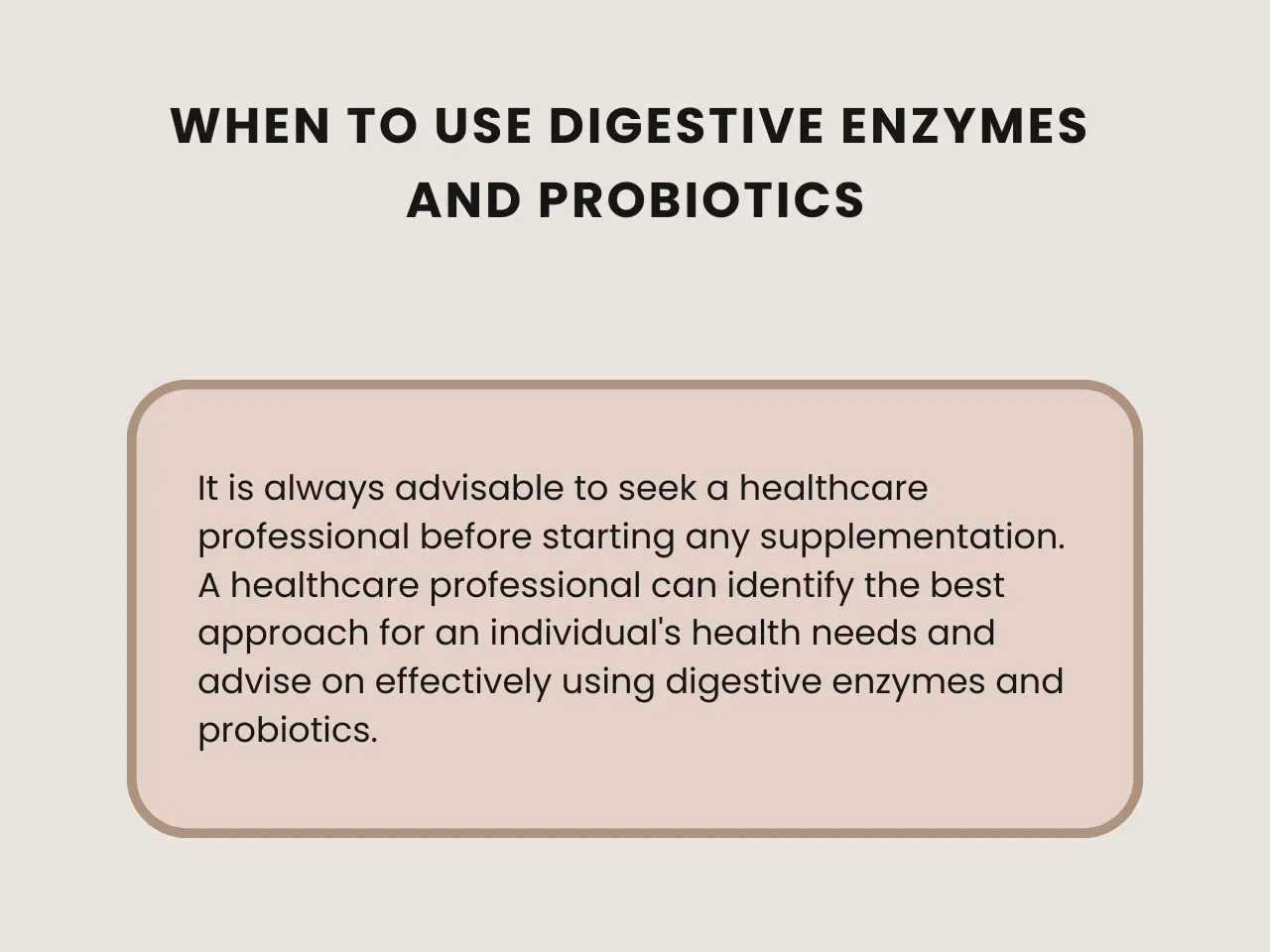
Combining digestive enzymes and probiotics can provide complete digestion support for some individuals. While digestive enzymes quickly alleviate symptoms through improved nutrient absorption, understanding the differences between digestive enzymes vs probiotics helps clarify their unique roles. Probiotics maintain better gut health and provide benefits beyond digestion, including enhanced immune function, mood balance, and skin health.
However, it is always advisable to seek a healthcare professional before starting any supplementation. A healthcare professional can identify the best approach for an individual's health needs and advise on effectively using digestive enzymes and probiotics.
Key Takeaway
Improvement in digestive health has to do with understanding the differences that exist between digestive enzymes vs probiotics. Both play an essential part in gut health; however, each supplies different benefits that best fit various needs. Knowing what each one brings can give you a good idea of which will be the best for your digestive problems. Consider specific health issues, desired outcomes, and how each supplement works to help you make a qualified choice.
Digestive enzymes act immediately in breaking up food taken into the body into carbohydrates, fats, and proteins that the body can absorb. This is especially good for those suffering from enzyme deficiencies or food intolerances. Probiotic capsules take time to give their results just by encouraging healthy gut flora, therefore performing their function of digestion, increased immunity, and general health slowly but surely.
Need help deciding between digestive enzymes vs probiotics? Nudge could give you a personalized experience to walk you through the best fit for your gut. We'll help you bring home the supplement that suits your rightful gut health journey. You can try our free trial today and level up your health transformation with our range of target-oriented supplements and personalized support.